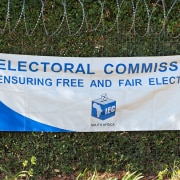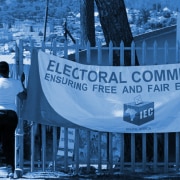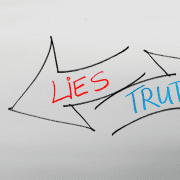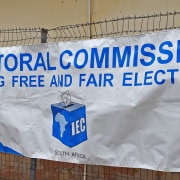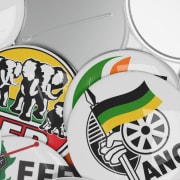|
Getting your Trinity Audio player ready...
|
President Cyril Ramaphosa signed Act 6 of 2018, otherwise known as the Political Party Funding Act (PPFA), into law in January 2019. The PPFA came into force on 1 April 2021 – more than two years later.
The act represents a significant step forward for democracy and accountability in the murky world of political party funding and opens up such funding to public and official scrutiny, as parties are now obliged to disclose their private sources of funding for amounts greater than R100 000.
Using the data gathered from disclosures submitted to the Independent Electoral Commission (IEC) – custodian of the PPFA – civil society organisation My Vote Counts (MVC) launched an interactive app which aggregates the information and makes it easier to track the private funding of political parties. The launch took place via a webinar.
The IEC publishes disclosures on a quarterly basis, and using visuals such as graphs and charts, the app Whose Vote Counts? opens up those disclosures to scrutiny by activists, voters, journalists, academics, and others.
“Who are these donors?” asked MVC. “What are the sources of their funds? What are their business interests? How may they use their money to influence government decisions, undermining the voices of the rest of us? How does the toxic relationship between money and politics determine who has a say?”
These are important questions. Buying influence in a party’s decisions in exchange for money is a real thing, said political studies professor Steven Friedman. “Private party funding is more often than not an attempt by the moneyed to ensure that government serves them, rather than their intended constituency of voters. While some give because they believe, many donors want to turn democracies into their property.”
This is why transparency in political party funding is not just a nice-to-have or a tactic to make life difficult for the parties involved. It is an imperative.
“We have a particular interest in understanding what we call the toxic relationship between money and politics, and removing that toxic relationship or making it less toxic,” said MVC executive director Minhaj Jeenah, adding that for decades money has been a means to obtaining influence in politics.
“We know that that since the early 90s … money has been used by politicians to influence decisions that that politicians make. Also to get access to politicians, which means access to the state, which means access to influence.
Evidence given before the Zondo commission exposed numerous examples of money buying influence during the height of the state capture era – one name that immediately comes to mind is that of facilities management company Bosasa.
“We believe this subverts a key tenet of our democracy – that the people must govern,” said Jeenah. “It takes power away from ordinary South Africans. Power is taken away by people with money, at the expense of our democracy.”
Whose vote counts really?
MVC developed the app in partnership with civic technology organisation OpenUp, which is also responsible for the very useful Parliamentary Monitoring Group website.
“Towards the end of last year, we worked with an investigative journalist to look at all the 60-odd donors that were disclosed through the party funding process,” said Jeenah. “If it’s a company, to understand who the board members are and what are their business interests, if it’s a trust who the trustees are. If it’s an individual, what their interests are.”
Whose Vote Counts? arose from the report written for this process. It features only direct donations from individuals trusts and businesses.
“Our job is to make data actionable, and to empower citizens through data,” said OpenUp’s Adam Oxford, introducing the tool during the webinar. “Small donations are not included … for example, the EFF doesn’t really appear very much because a lot of its individual donations are much smaller than R100 000 and come from members.”
It also doesn’t include, for example, the sale of tickets to gala dinners, which are “big, big money spinners for the parties”.
The tool shows the total amount of donations received over the two years since 2021 as R278 792 306.91
“Under R300-million in the space of two years, to me, doesn’t seem like a very big number for supporting political parties across South Africa,” said Oxford. “My first question would be, where’s the rest of it?”
He also expressed surprise that over the two-year period, only 137 donations were declared. “That seems very small and raises more questions. Where is the rest of the money coming from?”
Information can be filtered in various ways – by party, donation type (money or in-kind), the time period or quarter, donors, donor interest areas, and more.
The tool shows that around 41.4% (R115-million) of all private donations originates in the mining and coal and energy sectors. The second highest source, at 16% or R44-million, comes from online gambling mogul Martin Moshal. The Oppenheimer family is not far behind, having dished out 15.6% or R43.5-million.
Interestingly, the tool also shows that donors often spread their money out across several parties. For example, Patrice Motsepe has donated not only to the ANC, but also to the DA, EFF, Inkatha, and Vryheidsfront Plus.
Civil society’s role as party funding watchdog
The Coalition on Party Funding was formed in September 2021 to advocate for a transparent and accountable political funding space through collective action, with the aim of deterring the corruption and inept governance that has historically been shown to be a consequence of unregulated private money in politics.
The coalition comprises the Ahmed Kathrada Foundation, Corruption Watch, My Vote Counts, Open Secrets and Right2Know. It will work alongside the PPFA to engender political practices that work in the best interests of all in South Africa.
The reason such a coalition is necessary because of the reasons already mentioned by Friedman. In addition, according to the data available from the IEC, it would appear that provisions in the PPFA have already been breached – with the IEC’s knowledge.
Besides making the disclosure of donations over R100 000 mandatory, the PPFA also provides for the establishment and management of a public and private fund, while prohibiting donations to parties by foreign governments or agencies, foreign persons or entities, organs of state or state-owned enterprises.
Whose Vote Counts?, however, shows an amount of R8.7-million, or 3.6%, originating from foreign donors – raising yet more questions as to why this is possible.
However, we might still be waiting for the PPFA to come into force were it not for Corruption Watch (CW), which in December 2020 wrote to President Cyril Ramaphosa, raising concerns that there were potentially interests opposed to the PPFA, which were working to ensure that it would not be implemented. If true, we told Ramaphosa, such intentions would be deemed unlawful and unconstitutional.
“There is no reason why the date of the commencement of the Political Party Funding Act should not have been proclaimed at least a year ago.”
We said that if a commencement date in terms of section 26 of the PPFA was not decided on and enforced before 1 April 2021, to allow for the act to be implemented in the upcoming local government elections, we would seek an urgent application in an appropriate court for an interdict compelling the president to do so.
The Presidency responded quickly to confirm that the PPFA would be enforced on or before 1 April 2021.
In addition to advocacy, CW also made written and oral submissions on the Public Funding of Represented Political Parties Act, 103 of 1997 read in accordance with Regulation 10(1) of the Act in 2017, and written and oral submissions on the Draft Political Party Funding Bill in 2017 and 2018 respectively.

